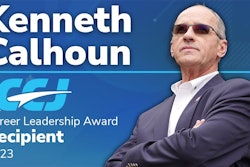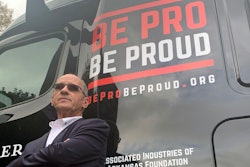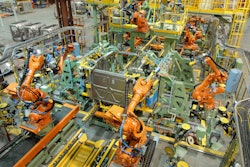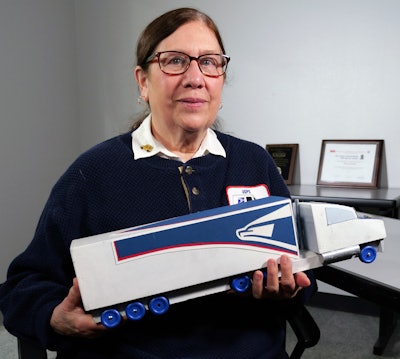
The 2024 CCJ Technology and Maintenance Career Leadership Award is sponsored by Bendix, Mobil Delvac, Peterson, Travel Centers of America, and Utility Trailer Manufacturing.
When Bonne Karim joined United States Postal Service (USPS) in 1972, a first class stamp was just 8 cents. Over the course of a career that spanned nearly four decades with USPS, that increased 575%. While she's not responsible for climbing postage rates, USPS's standard of excellence for vehicle maintenance training can be laid squarely at her feet.
Before she was charged with the training of USPS maintenance professionals that service a truck count in the U.S. roughly the combined size of package rivals FedEx and UPS, Bonne was a little girl growing up on American Indian reservations in the Western U.S. Bonne's father, Bill, was forester for the Bureau of Indian Affairs and managed the Indian Timberlands. His job, she said, would move the family every few years.
She was born on a Klamath Indian Reservation in southern Oregon, just a few miles from the rim of Crater Lake on April Fool's Day.
"My mom said when she told my dad she needed to go to the hospital, he didn't believe her and thought it was an April Fool's joke and almost didn't take her."
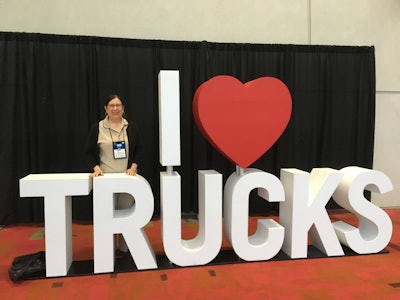
"After a couple years there, we moved to North Dakota where there wasn't a tree in sight," Bonne recalled, "but the Texas cattlemen used to bring their cattle up on the train every year to graze on the Indian lands in North Dakota and then ship them back to Texas in the winter. We actually lived at Standing Rock Indian Reservation, which was in the news the last few years over the pipeline issue."
The pipeline wasn't the region's first brush with tension as the Dakotas at the time were entrenched in an ongoing civil skirmish.
"I remember there was always a disagreement between North and South Dakota over Sitting Bull's body," she said. "So my dad would have to take turns with the other men going out and guarding Sitting Bull's grave from time to time."
From North Dakota the family moved to the Jicarilla Apache Indian Reservation in New Mexico where Bonne started school in a two-room schoolhouse, every row a different grade. "I remember we had a brother and sister that rode a horse to school and tied it up outside every day while we were in class," she said, "and we had a big old potbellied stove in the middle of the room just like you see in the old-timey movies."
Bonne's family eventually found its way back to Oregon where Bonne's father got a job as the City Forester in Portland. Bonne's mother, Freddie, found work as a bridal consultant at Lipman Wolfe & Co., and Bonne would remain in Portland, where she flourished in various academic clubs, like the chess club, and activities like playing in the school orchestra.
"I played viola, and all the students started trading with each other and learning how to play each other's instrument just on our own," Bonne said. "I remember in high school our conductor would come in and finally he just threw his hands up in the air, and he says, 'I don't care where you're sitting as long as you can play the part.' So I had a friend that played cello, and I traded with her a lot and actually got to teach cello to younger kids. And I had a guitar, played piano ... I've always wanted to learn how to play the banjo. I haven't done that yet."
Spreading her wings and reaching for the stars
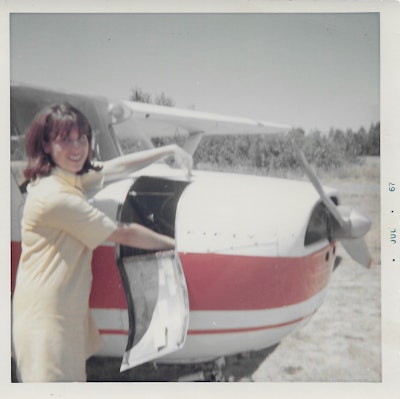
"I always wanted to be an astronomer when I was young, so I was majoring in physics," Bonne said, adding that she received her undergraduate degree in 1969 in math and physics. "I actually went two years to University of Oregon and then two years to University of Oklahoma, and then I decided that I wanted to do something a little more practical. Oklahoma didn't have an astronomy program at that time, and I followed a former math student and (went) over to engineering. So I switched over to industrial engineering and got a master's degree in Industrial Engineering from Oklahoma."
Bonne's path to the Sooner State wasn't as direct as enrolling in school. In the late '60s, she was one of the first women to join a Civil Air Patrol flight encampment.
"I actually got a call on a Friday afternoon and said if I could take the written exam on Monday and pass it, I could be Oregon's representative to the flying encampment," she said. "I holed up over the weekend and studied and took the exam and passed. There were only five girls that year, and they decided to put us all together in Lawton, Oklahoma. We were here for a whole month, all day long, flying all at the expense of the Air Force and got our pilot's licenses at the end of the month."
Having never had a car, Bonne got her pilot's license before she obtained a driver's license.
"The next summer I went to another Civil Air Patrol flying encampment in Reno, Nevada, and got my glider pilot license," Bonne said, "After all that I finally bought a car. I didn't know how to drive and had to have someone drive it home from the lot for me, and my mom actually taught me how to drive on the way back to Oklahoma for college and left me here with my learner's permit and my car – a turquoise '59 Bel Air "with the big tail fins. They had two on the lot – a six cylinder and an eight – and I bought the six because I liked the color best."
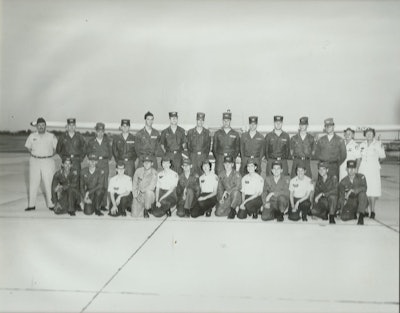
"I actually worked in the student union in the cafeteria, and he used to come there to eat and bug me all the time," she said.
The couple married July 20, 1969, the day astronauts Neil Armstrong and Buzz Aldrin became the first men to walk on the moon after reaching the surface in their Apollo 11 lunar module.
"We got married in Chicago and went to a friend's house to watch the moon landing on TV, and they cooked dinner for us ... And, like a lot of people just kind of got stuck in Oklahoma," she laughed. "I was fortunate the (USPS National Center for Employee Development) had been open a couple years before I graduated, and my department in industrial engineering was already doing some work with them, so I was able to transition right over there. I worked for the postal service for 39 years. Never had another job."
Neither snow, nor rain...
Bonne – an avid stamp collector with 40-plus pen pals all over the world – joined USPS in the early '70s as the letter carrier was undergoing a major shift toward automation, and it was her job to figure out how to maintain it.
"Rather than looking for a workforce outside, they were looking to build a maintenance workforce, and my job was to find out what kind of skills people need – maintenance, mechanics and electricians – and then to develop training programs," she recalled. "And we actually had fun for about a year and a half just getting to look at all these different electrical pneumatic hydraulic trainers, buy them and take the lessons and decide what the postal service should buy."
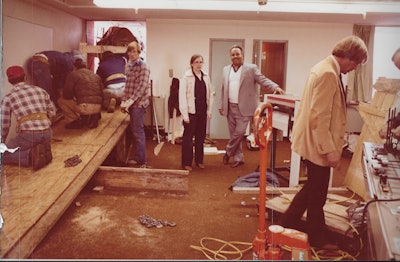
"After I took that class I was invited to come back and teach it," she said, adding that she was the lone female instructor for a decade, "and I just got involved in teaching and have been doing it ever since."
Bonne's reputation as a prolific teacher began to grow, and she started her climb up the postal service ladder through teaching roles, noting that the mechanical jobs or electro-mechanical jobs were the lowest level; if you wanted to get a promotion, you had to move up into electronics and other things.
"She's an encourager," said Lew Flowers, who worked both alongside and under Bonne for years at USPS, "and she's always looking for something else to make you better [and] working with you to make you better."
Bonne moved over to one of the mail processing equipment classes, "the one that they actually have a machine called a facer/canceler," she said. "If you think of mail going into a mailbox, it's just all dumped in every which way. When you get it to the post office, you have to sort it out and get it all facing the same way and then run it through a machine to cancel the stamps. It was interesting because when I worked on that bulk conveyor stuff, it was all really giant-size motors and things almost as big as diesel engines, and we had tow chains under the floor to pull carts around that weighed 50 pounds per running foot – so all these really big things and big gears.
"Then I went over to this other machine, and they happened to be doing mechanical when I was there and had the machine taken apart, and I thought, 'Oh my God. How am I all going to learn these little teeny weenie parts?' I was used to all these things that were so big, and I used to go in at night after class and just take the machine apart by myself and put it back together just to learn how to do it so I could do it with the students," she said.
A manager job for the delivery vehicle branch opened in 1986, and Bonne bid for the position – a job at the time she didn't necessarily want.
"Being young and naive, I thought, 'Well, if I bid it, they'll give it to one of the guys and move me over into their mail processing job. But it didn't work that way. I got it, and I was it. So then I had to learn about trucks," she laughed.
Bonne did more than learn about trucks. As training branch manager over the Fleet Training Group, she oversaw more than 20 instructors that trained maintenance professionals for the entire U.S., and Flowers noted that under her leadership, these courses were nationally recognized for being best in class.
The USPS fleet in the late '80s was nearly a quarter of a million trucks, and it's still one of the largest civilian fleets in the world. Bonne said USPS kicked off a decentralization project that would call for a reduction in maintenance training and contract out much of its fleet service.
"That just didn't seem like a smart thing to do. We had over 220,000 trucks and over 200 garages and a lot of people employed, and the mail depends on the trucks," she said. "I always say if the trucks aren't moving, the mail's not moving, regardless of what you have to process it with. So I actually became an advocate for keeping not only the training but also the vehicle maintenance in the postal service.
"I remember the deputy postmaster general asking me if we have to have maintenance. 'Why can't we just drive the trucks down to the corner service station and get them fixed?' Well, it doesn't work that way,'" she replied. "They don't work on big trucks."
One of the things working against Bonne was that the City of Los Angeles had contracted out maintenance for its municipal fleet, and USPS leadership was starry-eyed over the potential cost savings.
"I did a lot of research on that and found out the contractor that got the Los Angeles contract, after nine months, came back to the city and said, 'We can't do this. We want out of the contract.' And the city had to take it back," she said. "So it's not easy, especially for a large fleet. We had over 220,000 trucks. People don't think about the postal service as being a trucking company. It's very important to our company, and there's so much emphasis on drivers and other things, but even the drivers can't drive if the truck doesn't run. It's like pieces of a puzzle. Every piece is important and has its role to make the whole thing go."
Bonne and her team were ultimately able to secure keeping maintenance training and service in house, preserving countless jobs and efficiencies.
"We have a school in Norman that does all the technical training – all the maintenance training – and a lot of people don't realize it, but the postal service does all their own maintenance. We do building maintenance; we do the equipment maintenance; we do the vending machines, the trucks, anything you can think of; environmental training," she said, "and I actually had more than just the vehicles under my branch, but when I went over into the vehicles, I was just really interested in that, and I put all my focus there and let my supervisors over the other things do the day-to-day stuff on that. I had a safe-cracking class under me too that was part of the vehicle group. Every post office has a safe and vault, and you need maintenance on them."
Life post-post office
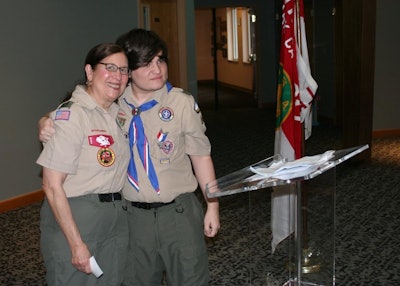
Bonne serves as chairman of the Oklahoma Trucking Association’s Technology Maintenance Council and was one of the first volunteers to chair the TMC Professional Technician Development Committee (PTDC), created in 2005, which runs the national technician skills competition. She received TMC's Silver Spark Plug in 2013 and is a recipient of the TMC Study Group Leadership Award. Bonne was also the USPS nominee for the Federal Government Women in Science & Engineering (WISE) Award.
Bonne received TMC's Uncle Darrell Hicks Mentor Award in 2018.
"She is a quiet force of nature, and everything she does has a touch of excellence on it," said Jim Newport, president and CEO of the Oklahoma Trucking Association. "There is no [Oklahoma] Technology and Maintenance Council without Bonne in my mind. She's, I think, a national treasure. We couldn't be more proud to have her."
She served as the chair of the Automotive Training Managers Council (ATMC) Training Awards Committee for many years, as well as ATMC program chair and president. With both TMC and ATMC she's been active in outreach with high school and vocational school career counselors to provide accurate information about diesel technician careers.
"I just love doing what I do, and I love working with the students," she said. "I'm an organizer. I love putting together this fall technical workshop that we have every year and putting together the Super Tech competitions. Every once in a while, I say, 'I'm not going to do it anymore. I need to take a break.' And 10 minutes later, I'm busy planning next year."
Bonne has never strayed far from her teaching and training roots, and Newport lauded her willingness to share her immense background with current maintenance professionals and students.
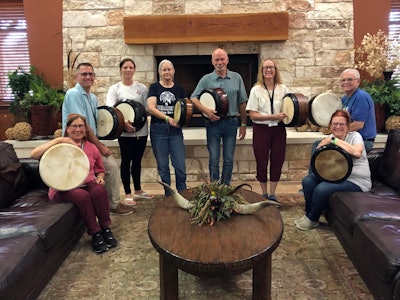
Indeed, Bonne is likely busier in her retirement than most people are in their full-time jobs. She corresponds by mail with inner city elementary school students in the Chicago area. She works with the Special Olympics and volunteers at a local homeless shelter every Tuesday morning, where she helps cook and goes shopping for them. Bonne is also a runner in the Oklahoma Memorial Marathon, an annual race honor of the 168 people killed in the 1995 Alfred P. Murrah Federal Center bombing, and is active in the Boy Scouts of America. She's a certified merit badge counselor for Truck Transportation; the badge requirements involve learning about trucking's role in the economy, visiting a trucking company, gathering information and making a decision on a sample shipment in addition to interviewing a driver and technician to learn about careers in trucking.
"I just have a million interests. I am always going every which direction, but I just like to be busy and everything interests me. That's my problem," she said. "When I retired, my staff bought me a harp. I'd always wanted to learn the harp. And then my other managers, they bought me the Irish bodhrán drum, and so I've been learning how to play those. I just love music. I'm game to try anything."



